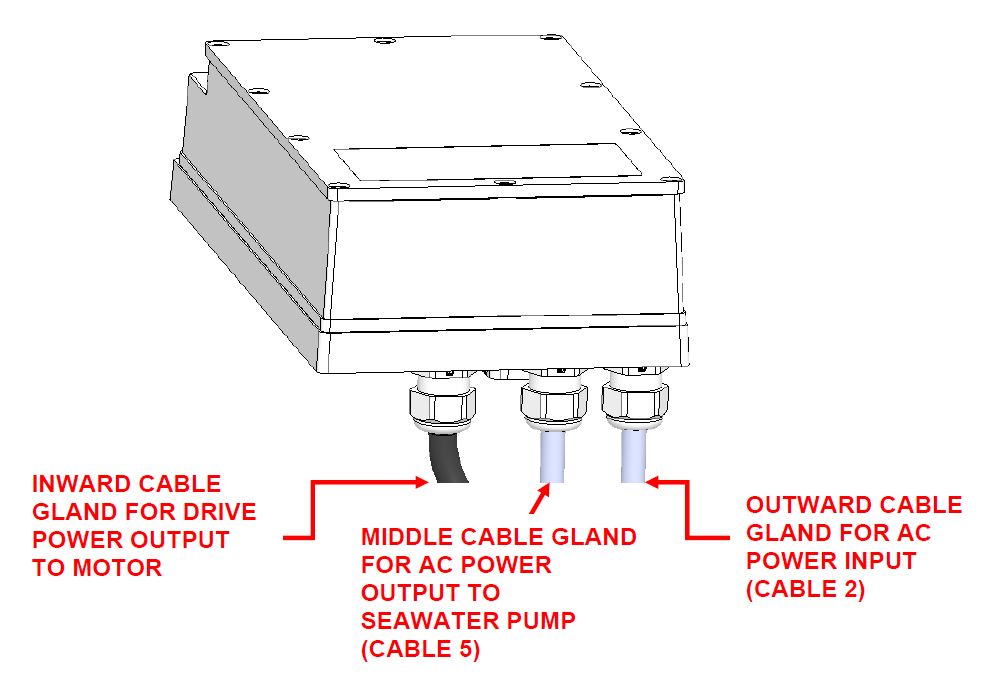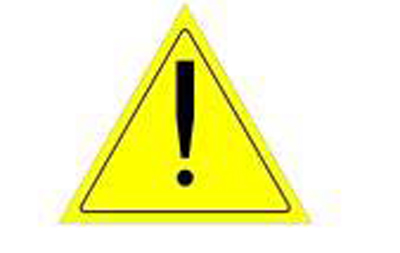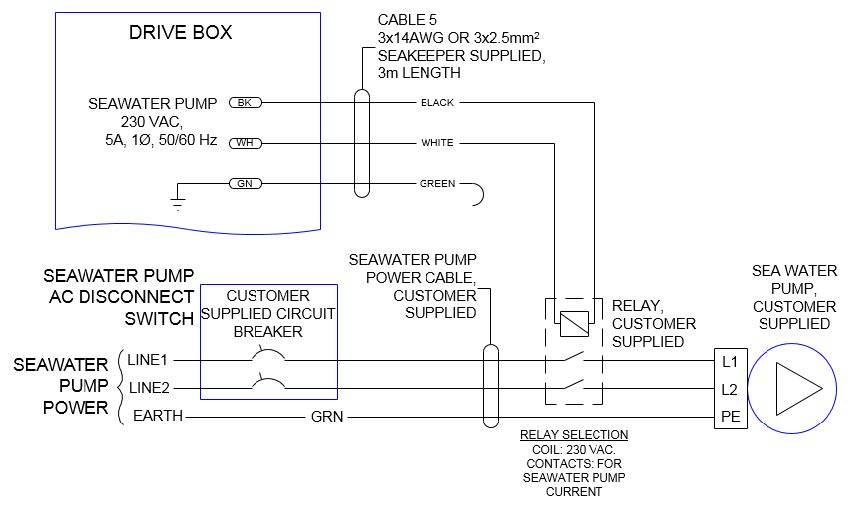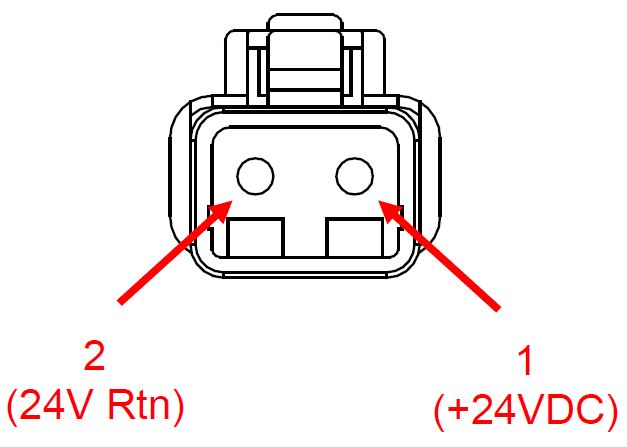Seakeeper 26 Installation Manual (90265-8); S/N 26-233-0690 to Current
3.2 Electrical Equipment Power Connections
230 VAC Power Source Requirements
- 230 VAC (nominal), 1 Phase, 50/60 Hz, 30 A
- For installations of more than one Seakeeper, a separate circuit breaker must be used for each Seakeeper Motor Drive Box.
Drive Box AC Power Input Connection Instructions
- Cable: 3 x 10 AWG (3 x 6 mm2 CSA), 10 ft (3 m) length, Seakeeper supplied pre-installed.
- Locate AC Power Input Cable to the Motor Drive Box.

Figure 2 – Motor Drive Box AC Power Input & Output Cable Glands
Figure 3 – AC Power Input Cable Wire Connections at AC Power Distribution Panel - Connect 230 VAC wires in AC Power Input Cable to a 30 A, double-pole Circuit Breaker at an AC power distribution panel according to Figure 3 above.
- Locate AC Power Input Cable to the Motor Drive Box.
Drive Box AC Power Output to Seawater Pump Connection Instructions

Verify that AC power is OFF to the Drive Box before connecting Seawater Power Cable to a Seawater Pump.
- Cable: 3 x 14 AWG (3 x 2 mm2 CSA), 10 ft (3 m) length, Seakeeper supplied pre-installed.
- Pumps rated at 230 VAC, 5 A max., Customer-supplied.
- Locate AC Power Output Cable to the Seawater Pump from the Drive Box at the middle of three cable glands. (See Figure 2 above).

Figure 4 – AC Seawater Output Power Cable - Connect the 230 VAC wires in AC Seawater Power Cable to a 5 A (maximum), Seawater Pump (approximately 1/3 horsepower or 250 W) according to Figures 4 and 5.

Figure 5 – Seawater Pump Power Cable Wire Connections to Seawater Pump
- Locate AC Power Output Cable to the Seawater Pump from the Drive Box at the middle of three cable glands. (See Figure 2 above).
- If the customer-supplied Seawater Pump is not rated for 230 VAC, the Seawater Pump Power Cable output may be used to switch a customer-supplied relay.
- Locate AC power output to the Seawater Pump from the Drive Box at the middle of three cable glands as shown in Figure 2.
- The recommended wiring is shown in Figure 6. Refer to Figure 4 for Seawater Pump Cable wire connections.


Seawater Power Cable contains live voltage when Seakeeper is in operation. Do NOT cut Seawater Power Cable. Do not remove Seawater Power Cable from Drive Box.
- If Seawater Power Cable is not used, bundle cable and secure to forward brace or other area nearby which will not come in contact with moving parts during Seakeeper operation. Do NOT cut Seawater Power Cable as it contains live voltage when Seakeeper is in operation. Seakeeper ships with Seawater Power Cable permanently sealed at end of cable with protective cap in the event it is not used. Do NOT remove Seawater Power Cable from Drive Box as moisture will be free to enter box through open cable gland and corrode internal electronic components
24 VDC Power Source Requirements
- 24 VDC, 15 A
- A separate breaker should be used for each Seakeeper control power input.
DC Power Connection Instructions

Reversing polarity on the DC power input to the Seakeeper can result in damaging the electronics in the control system.
________________________________________________________
When energizing DC power for the first time, if Display does not power up immediately then disconnect and inspect connector polarity.
- 24 VDC, 15 A, 2 x 12 AWG (3 x 4 mm2 CSA) customer supplied.
- Install Seakeeper provided DC Power Input Cable, P/N 20248.
- Route DC Power Cable to DC Power Distribution Panel.
- Terminate positive (B+, Red) conductor through dedicated over-current protection device (customer supplied) and to +24 VDC.
- Terminate negative (B-, Black) conductor to battery negative terminal or negative bus.
- Before connecting DC Power Cable to Seakeeper, check for proper voltage and polarity with a DC multimeter using Figure 7 below.
- Connect DC Power Cable to 24 VDC input receptacle on Seakeeper.
- Install Seakeeper provided DC Power Input Cable, P/N 20248.
